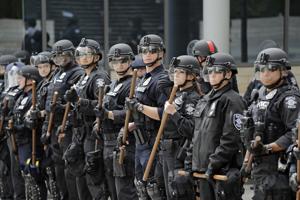Washington lawmakers strengthen ‘duty to intervene’ laws as calls for police reform continue

(The Center Square) – By law, Washington police must stop excessive force wherever they see it, but a bill passed by the state legislature would make that law a workplace policy.
Sponsored by state Sen. Manka Dhingra, D-Redmond, Senate Bill 5066 makes it a police officer’s duty to intervene, physically or otherwise, when their peers use excessive force or other wrongdoing “contrary to law” or department policy. The bill would give police agencies until 2022 to hammer out written policies detailing such duties and provide related training. Those policies will be subject to review by the state Criminal Justice Training Commission.
The bill takes effect 90 days after the state legislature is scheduled to adjourn on Sunday. It passed the Senate Tuesday by a vote of 31-18 after passing the House by a vote of 71-27 in February. It now heads to Gov. Jay Inslee.
Dhingra, a former deputy King County prosecuting attorney, described the bill in January to the Senate Law and Justice Committee as enabling officers to hold themselves and their peers to the highest standards.
“I will say that the vast majority of officers are doing the right thing and they hold themselves up to a high ethical standard,” Dhingra said. “This bill is about empowering our good officers to continue to do the right thing and that they are in a position to call out when they see wrongdoing and are in a position to intervene when they need to.”
Several law enforcement groups critical of the bill say it’s unnecessary at best and risks needlessly indicting officers at worst.
“This is something that the vast majority of law enforcement already do,” said James Schrimpsher, Vice President of Washington State Fraternal Order of Police, in January. “It’s ingrained in our DNA, so to speak.”
Others have expressed concerns the bill could lead to cases of misjudgment.
“Two officers at the same scene can still perceive things differently,” said James McMahan, a lobbyist with the Washington Association of Sheriffs and Police Chiefs. “We wouldn’t want a situation where the observing officer is required under penalty of decertification to physically intervene when it may not actually be necessary.”
More than 90 people have been killed by police in Washington since voters passed I-940 in 2018, removing proof of malicious intent from the process of prosecuting police brutality cases. They include Manuel Ellis, a Black man from Tacoma who was beaten, tased, and sat on by four officers—one Asian, one Black, and two white—during a traffic stop in March of 2020. His death was ruled a homicide that year by the Pierce County Medical Examiner, who determined the 33-year-old died from “hypoxia due to physical restraint.”
The case remains under review by state attorney general Bob Ferguson’s office 13 months later.
“SB 5066 is a step in the right direction, but it will not fully address the institutional racism that exists in law enforcement agencies across the state,” said Sakara Remmu, lead strategist for the Washington Black Lives Matter Alliance in January.
Data on the use of force by Washington police isn’t widely available. No searchable public database for the topic exists, but one bill sponsored by Dhingra, SB 5051, would create one for police complaints and disciplinary history. It is also on its way to Inslee’s desk.
Bringing an officer in front of a judge and jury have proven rare due to police union rules that protect them based on a Seattle Times investigation. State lawmakers may have to wait until next year to revisit them.
Disclaimer: This content is distributed by The Center Square


